The hammer seizes its actuality

Photo by Walid Rashid
The hammer seizes its actuality is an ongoing series of works which delve into the construction and montage of images taken in Palestine and circulated in viral social media spaces. These images, meant to document and inform viewers of the daily occurrences of extreme violence, are contextualized in digital spaces which promote the rapid consumption of images-as-content and create a dispersive montage for Palestinian images to exist within. This algorithmically determined juxtaposition creates a context where extrajudicial killings of Palestinian youth compete with cat videos and pasta recipes in a constant stream of content.
Additionally, these digital spaces have terms and conditions which shape the way in which the images themselves are photographed, edited, and shared so as to gain priority and viewership within social media algorithms. Images are blurred to avoid censorship by social media platforms and to protect the identities of protesters and freedom fighters from arrest or assassination; emojis draw attention to or conceal certain elements in the image. Speed is essential to sharing information, so people often elect to film screens which play back CCTV footage rather than export the footage, distorting the colors and forms in this doubled recording. Often in life-threatening situations, photographers regularly capture images clandestinely from behind a window.
I have been collecting and isolating formal elements that create Palestinian digital images to create a sort of taxonomy. Formal elements such as color, framing, obstruction or distortion of bodies and objects, gestures and lines of movement, digital intervention, light, and shadow, serve as points from which to compose and trigger new modes of sight, making visible the forces that create the images while breaking or slowing the cycle of never-ending circulation and consumption. Rather than informing the viewer of an event, the aesthetic conditions of the event become available to the viewer.
These drawings and prints are then presented with their original captions.
Works are organized by year.
2024
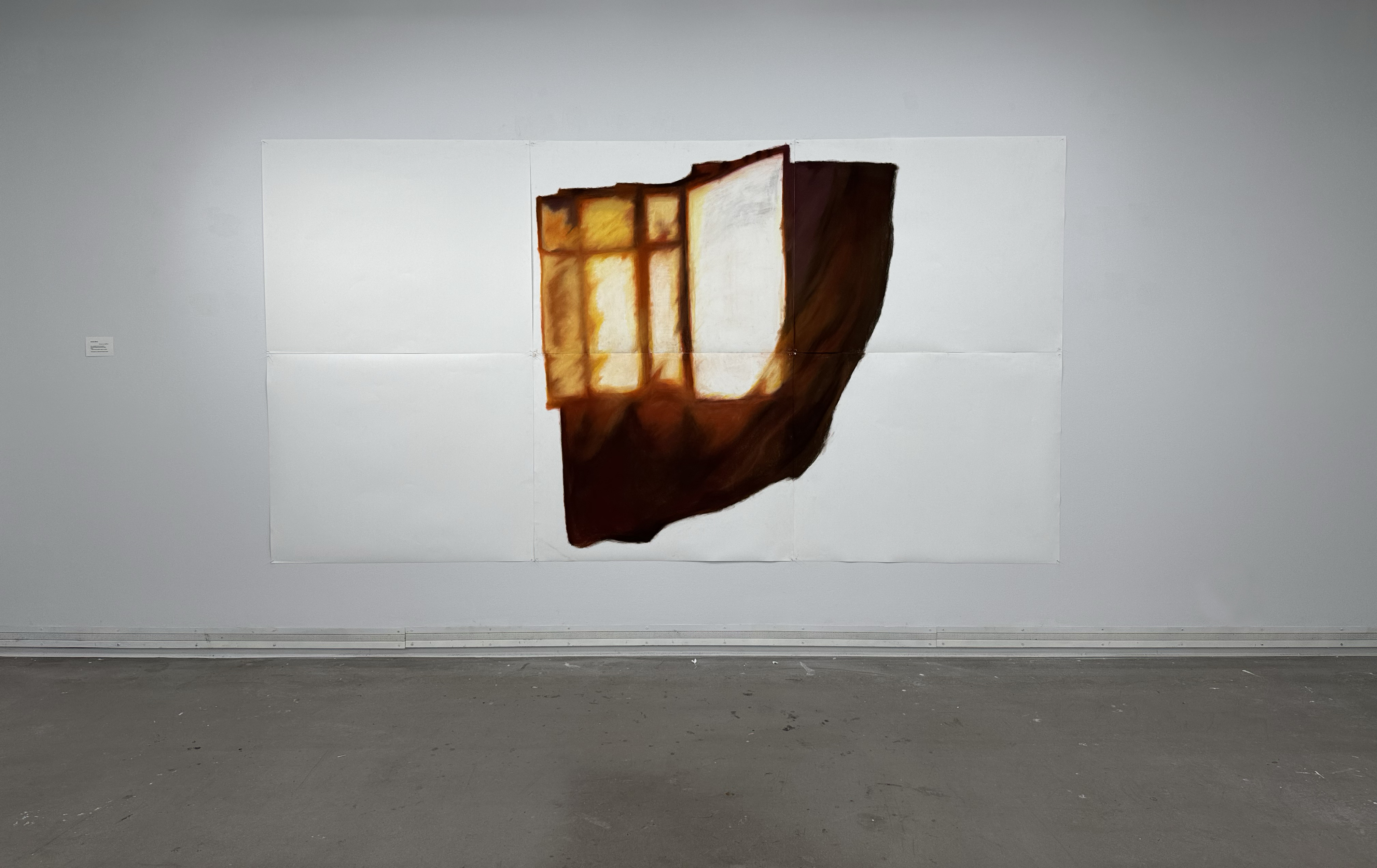
Curtain (Slow) (2024)
Pastel on paper
305 x 163 cm / 120 x 64 in
This piece was produced as part of the Windows series.
“Even breakfast cannot be enjoyed #bombing #gazaisunderbombs #gaza #rafah” —@mahmoud_al.saleh, March 16, 2024, Photography by Mahmoud Khaled Alsaleh.


Rear Window (2024)
Pastel on paper
118.9 x 168.2 cm / 66.2 x 46.8 in
This piece was produced as part of the Windows series
“This is what Khan Younes looks like in the Southern Gaza Strip right now..continuous bombing, it is noteworthy that Khan Younes is one of the areas marked as safe by the occupation.”
– @gazanow, December 2, 2023. Photographer unknown
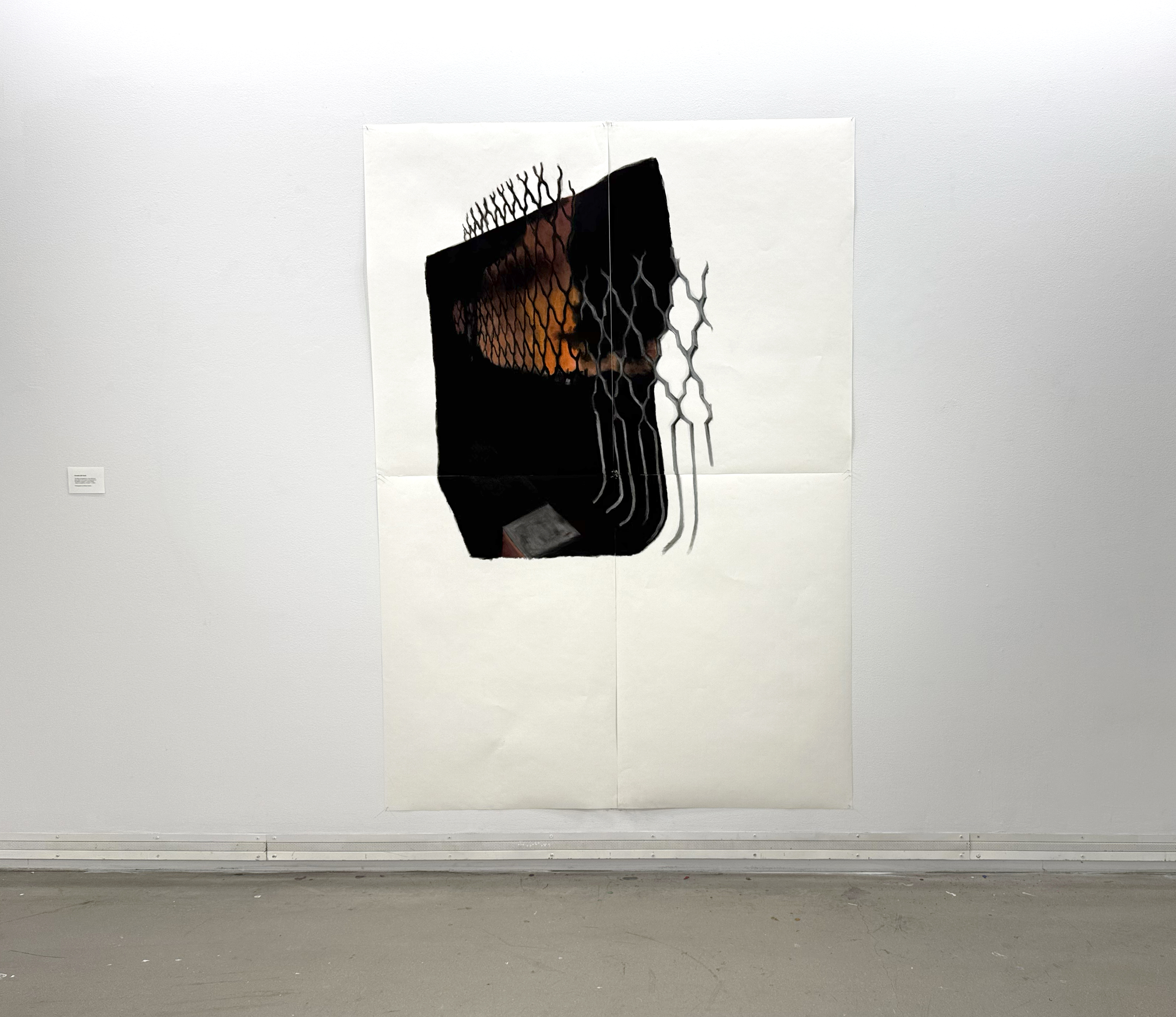
Rumble (Oh God) (2024)
Pastel on paper
137x203 cm / 54x80 in
This piece was produced as part of the Windows series.
“The MoH spokesperson: Over 500 have been killed in the Israeli bombardment of the Baptist Hospital in central #Gaza”
–@eye.on.palestine, October 17, 2023. Photography by Motaz Aizaiza.
2023
 Bloodstain (2023)
Bloodstain (2023)Digital print on paper
A2 (42 x 59.4 cm / 16.5 x 23.4 in)
“The place where 3 Palestinians were executed by the Israeli occupation forces at the entrance of Sarra village, southwest of Nablus.” – @eye.on.palestine, March 12, 2023. Photography by Wahaj Bani Moufleh
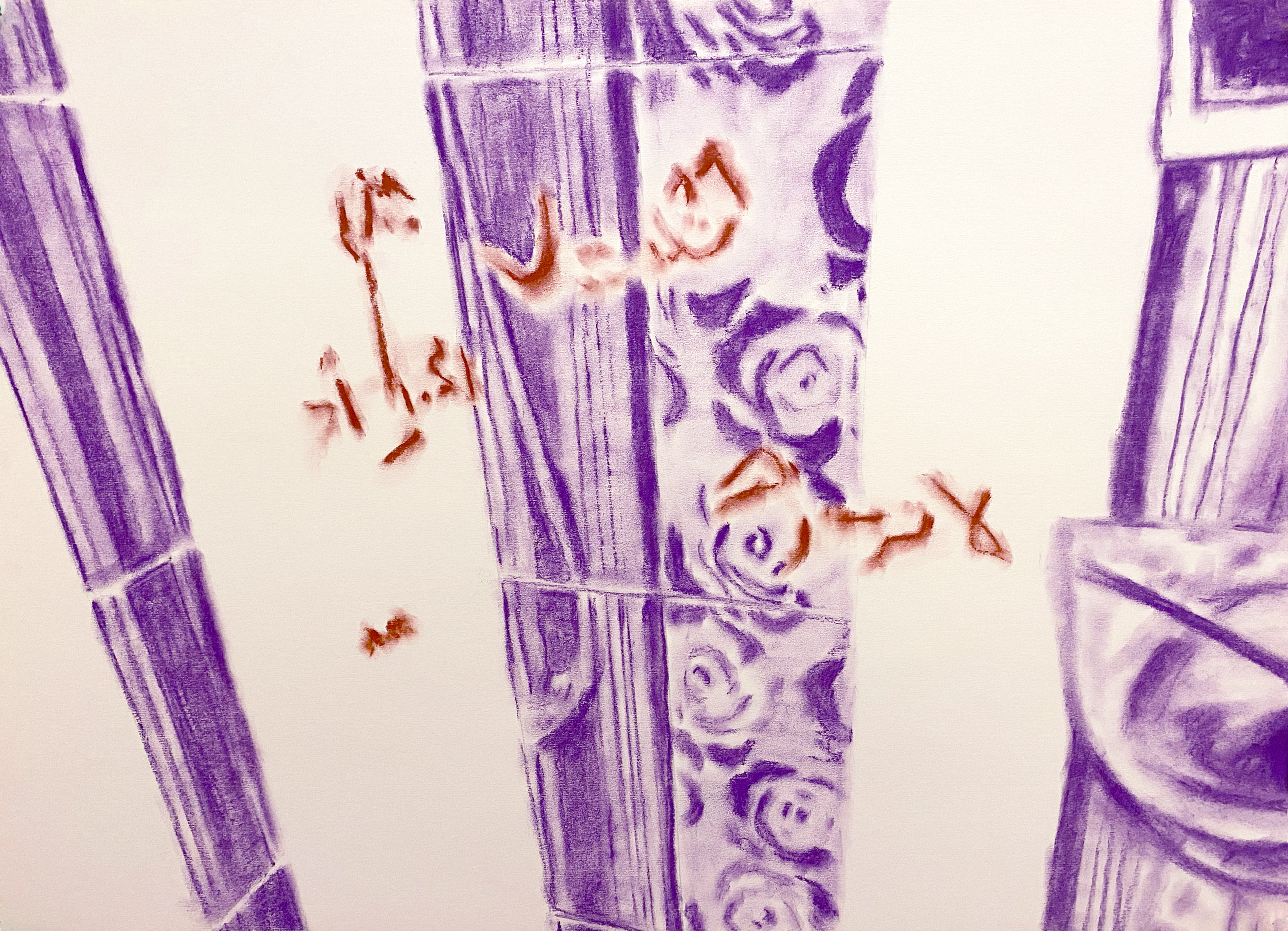
Message to Mother (2023)
Pastel on paper
A2 (42 x 59.4 cm / 16.5 x 23.4 in)
“‘I love you my mother..Do not have mercy on them.’..the last thing that one of the fighters wrote with his blood during his siege in Rujib, east of Nablus, prior to his arrest..” – @palestine.pixel, August 30, 2022. Photographer unknow

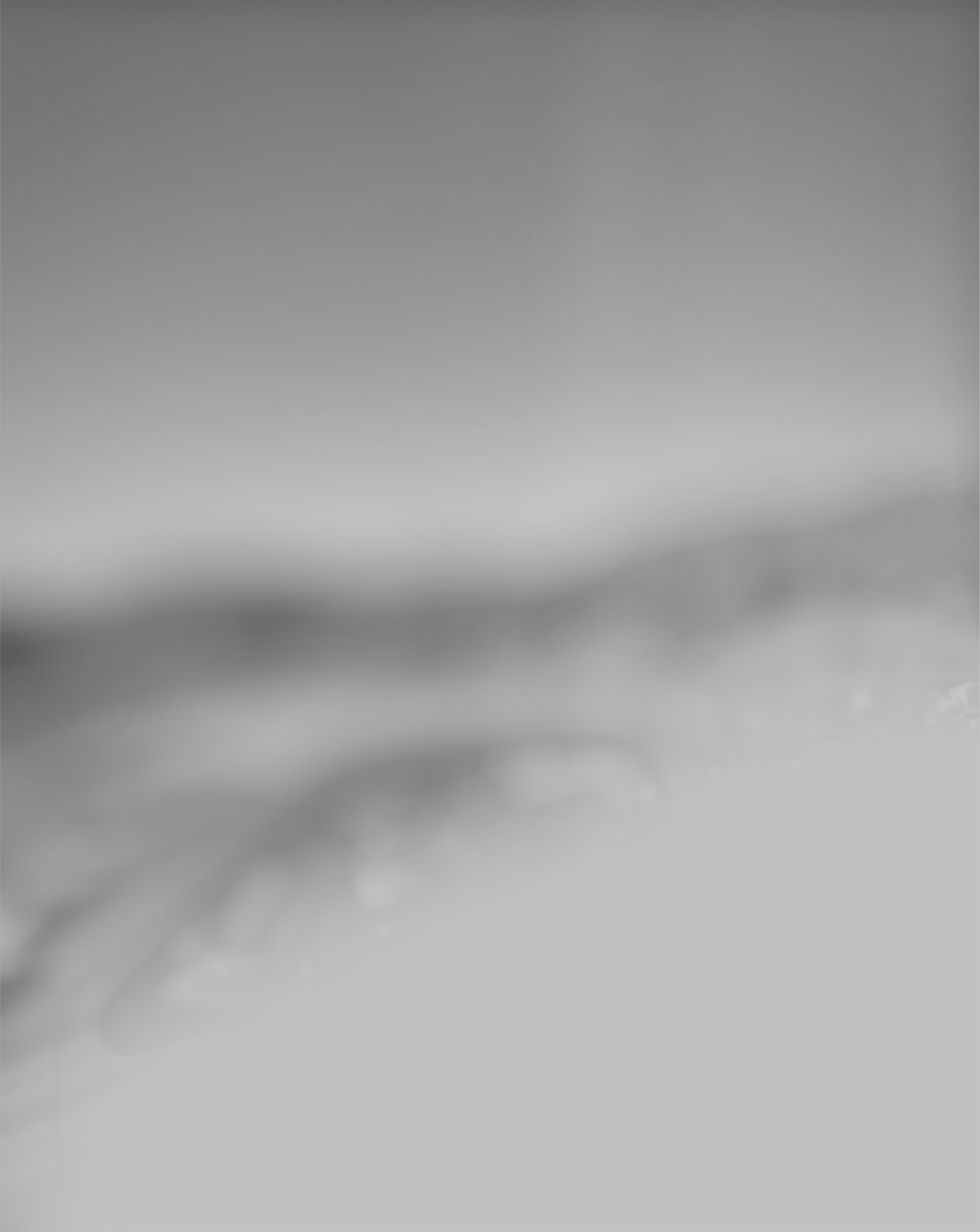
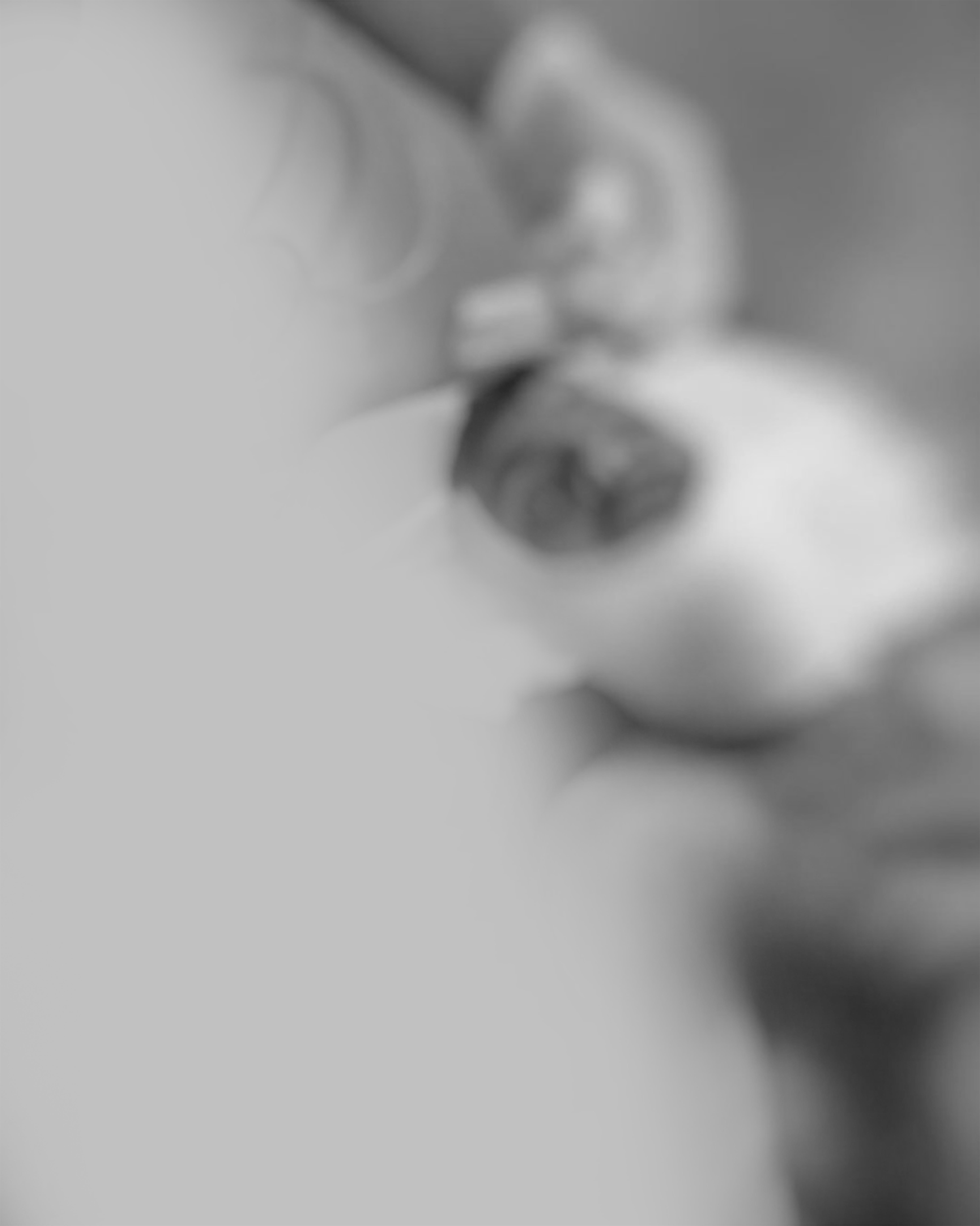
From left to right
Blur I (2023)
Digital print mounted on dibond
25 x 31.5 cm / 9.8 x 12.4 in
“Israeli Media: 5 Israeli settlers were injured in a shooting that took place in Ma’ale Adumim illegal settlement east of Jerusalem.”–@eye.on.palestine, August 1, 2023. Photographer unknown
Blur II (2023)
Digital print mounted on dibond
25 x 31.5 cm / 9.8 x 12.4 in
“The Israeli occupation forces execute three Palestinians near Arraba town, southern Jenin” –@eye.on.palestine, August 6, 2023. Photographer unknown
Blur III (2023)
Digital print mounted on dibond
25 x 31.5 cm / 9.8 x 12.4 in
“The Ministry of Health: The death toll in Jenin has risen to 12.”–@eye.on.palestine, July 4, 2023. Photographer unknown

Arrest (2023)
Charcoal on paper
A2 (42 x 59.4 cm / 16.5 x 23.4 in)
“The Israeli occupation forces detain a Palestinian young man after assaulting him in Sahleh street in Hebron.”
– @eye.on.palestine, August 14, 2022. Photographer unknown
 Camera 03 (2023)
Camera 03 (2023)Gouache, charcoal, conté on paper
(43 x 43 cm / 17 x 17 in)
“The Israeli occupation forces detain a number of Palestinians during military raids in the occupied West Bank.” – @eye.on.palestine, November 5, 2022. Photographer unknown
A raid is carried out in the middle of the night. The video we see, however, is not a video of the raid taking place in realtime, but is instead being filmed by someone replaying surveillance camera footage; the documentation of the raid is mediated by the screen. The effect of this mediation creates a moiré pattern, distorting the image in certain moments and making the pixels of the monitor visible in other.
I choose to isolate a still from the first few seconds of the video in which the moiré is most distinct and the bodies of the soldier and the detainee as well as their surroundings are most distorted, making present the digital materiality of the original image as well as the digital circulation of images.
2022

REDGREENANDBLUE (2022)
Pastel on paper
70 x 100 cm / 27.6 x 39.4 in
“The Israeli occupation forces attack an entertainment activity for Palestinian children in the village of Ras Karkar, west of Ramallah City, today.” – @eye.on.palestine, April 22, 2022. Photographer unknown
Photo by Walid Rashid
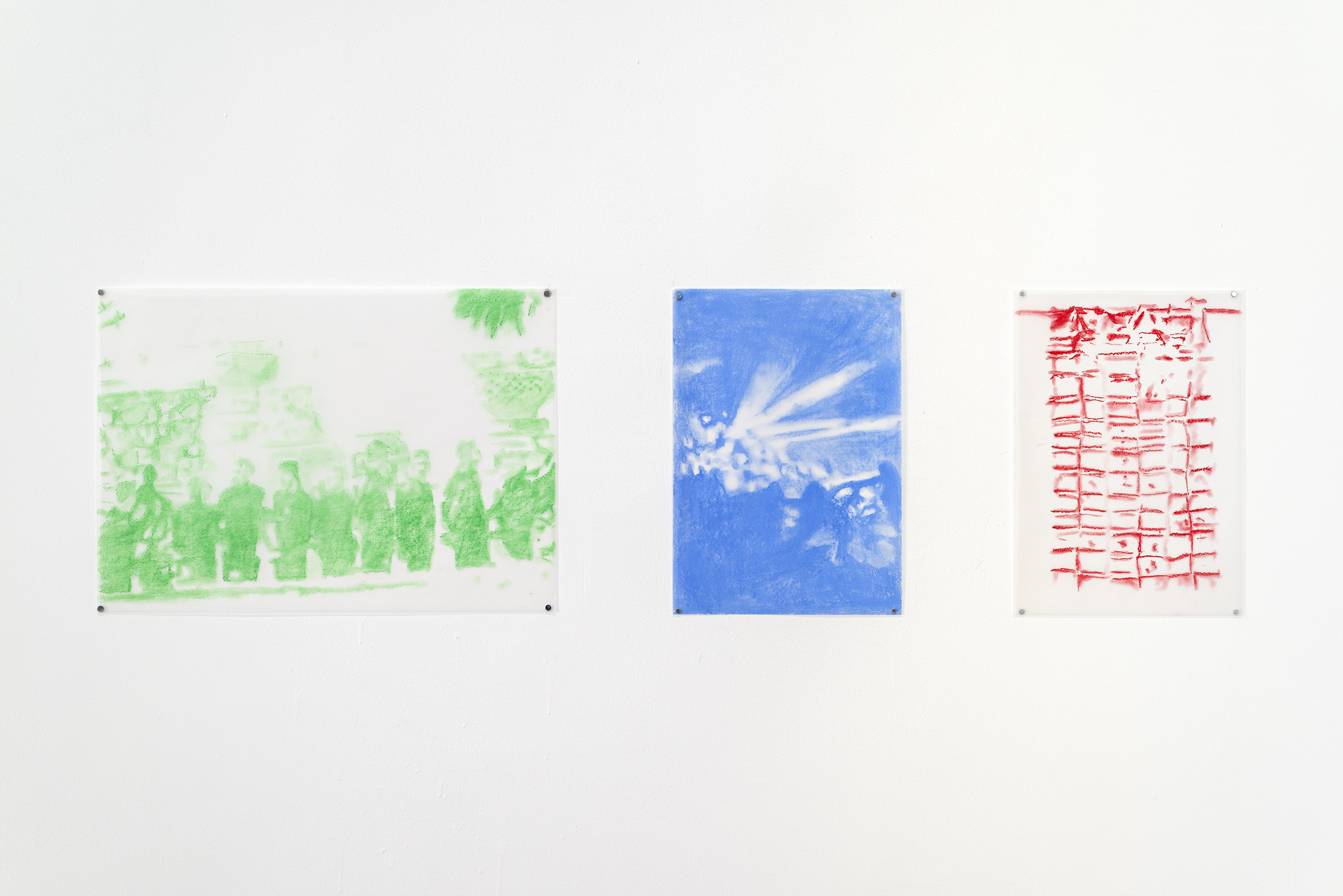
Left to right
Pillars (2022)
Pastel on paper
A2 (42 x 59.4 cm / 16.5 x 23.4 in)
“The Israeli occupation forces transfer dozens of detainees from Al Aqsa mosque through Al Magharbeh gate.” – @eye.on.palestine, April 15, 2022. Photographer unknown
Nights of Confusion (2022)
Pastel on paper
A3 ( 29.7 x 42 cm / 11.7 x 16.5 in)
“✌️الإرباك الليلي في هذه اللحظات في بيتا " “Night confusion in this moment in Beita” – @savebeita, June 21, 2022. Photographer unknown
Photo by Walid Rashid

Flag (2022)
Pastel on paper
A3 ( 29.7 x 42 cm / 11.7 x 16.5 in)
For the first time in 20 years, the Palestinian flag was flown over the Dome of the Rock in the Al-Aqsa Mosque in occupied Jerusalem.”
–@eye.on.palestine, April 22, 2022. Photography by Abdalafo Bassam
In what could easily be interpreted as a symbolic gesture of nationalism, following an escalation in acts of aggression and arbitrary arrests by Occupation forces at Al-Aqsa Mosque during Ramadan 2022, an anonymous individual manages to mount the Palestinian flag on top of the iconic golden Dome of the Rock. Upon closer inspection, one can see that the flag has deep wrinkles running through it in a grid-like pattern, meaning that this individual folded the flag many times in order to sneak it through security checks and later hang it. It is this gesture that I decide to capture, drawing only the folds and the wrinkles of the flag in monochrome. The flag, usually a symbol of nationalism, becomes an image of a gesture.
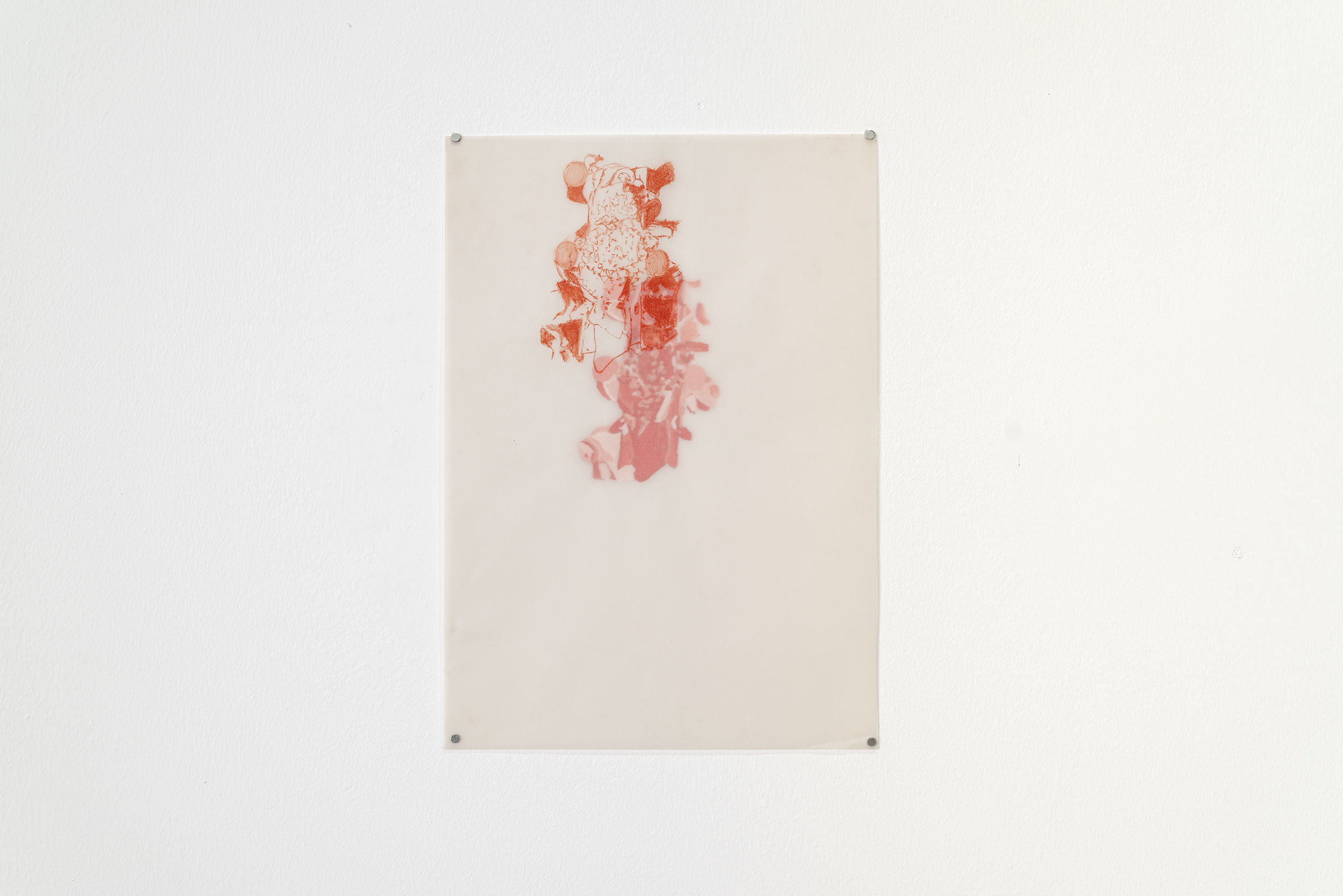
The Eyes are Wide Open (2022)
Conté and gouache on paper
A3 ( 29.7 x 42 cm / 11.7 x 16.5 in)
“The funeral of the child Amjad Abu Sultan (14) whose body was released [a] few days ago after months of holding it by the Israeli occupation forces.” – @eye.on.palestine, November 26, 2021. Photographer unknown.
An image taken from above in 2021, dominated by the color red.The body of fourteen year-old Amjad Abu Sultan has finally been returned to his family and they hold a public funeral for him. Because the Occupation forces kept his corpse in cold storage for several months, his eyes, which are peaking out from under a keffiyeh covering his face, are frozen open, staring directly at the viewer.
He becomes a red monochrome; the image of the funeral procession is abstracted, becoming an aerial view of a landscape or a floating object with a multi-tonal shadow.
Photo by Walid Rashid

Shadow (2022)
Diptych, digital print and charcoal on paper
Each image is A2 (42 x 59.4 cm / 16.5 x 23.4 in)
“The Ministry of Health: A 17 years old boy died of his wounds sustained by the Israeli occupation forces in Jenin city.”
– @eye.on.palestine, March 31, 2022. Photographer unknown
An image of a seventeen year old boy killed earlier in a raid is taken from behind the bars of a balcony or window. The shadows of the cars around the body are long, suggesting the image was taken in the early morning. The splayed body of the unnamed boy, who was wearing all black, has been blurred to avoid censorship. The combined effects of the angle from which the photo has been taken, the long shadows around the body, and the blurring of the boy’s body, makes the corpse look as if it were a shadow rather than a body. A shadow without a body.
My digital interventions enhance and emphasize the shadows in the image. The cars become shadows, the shadows in the image are darkened, creating a flattening effect in which the objects in the image lose dimensionality. The shadow without a body almost seems naturally occurring in this altered image. The static force of the sun, not pictured, but felt through the shadows it creates, is revealed.